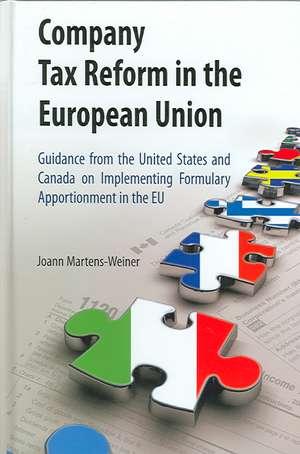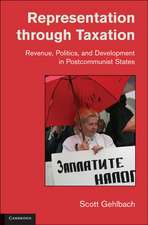Company Tax Reform in the European Union: Guidance from the United States and Canada on Implementing Formulary Apportionment in the EU
Autor Joann Martens-Weineren Limba Engleză Hardback – 21 noi 2005
| Toate formatele și edițiile | Preț | Express |
|---|---|---|
| Paperback (1) | 620.08 lei 6-8 săpt. | |
| Springer Us – 29 oct 2010 | 620.08 lei 6-8 săpt. | |
| Hardback (1) | 626.15 lei 6-8 săpt. | |
| Springer Us – 21 noi 2005 | 626.15 lei 6-8 săpt. |
Preț: 626.15 lei
Preț vechi: 736.65 lei
-15% Nou
Puncte Express: 939
Preț estimativ în valută:
119.83€ • 124.47$ • 99.54£
119.83€ • 124.47$ • 99.54£
Carte tipărită la comandă
Livrare economică 04-18 februarie 25
Preluare comenzi: 021 569.72.76
Specificații
ISBN-13: 9780387294247
ISBN-10: 0387294244
Pagini: 122
Ilustrații: XVII, 122 p.
Dimensiuni: 156 x 235 x 10 mm
Greutate: 0.38 kg
Ediția:2006
Editura: Springer Us
Colecția Springer
Locul publicării:New York, NY, United States
ISBN-10: 0387294244
Pagini: 122
Ilustrații: XVII, 122 p.
Dimensiuni: 156 x 235 x 10 mm
Greutate: 0.38 kg
Ediția:2006
Editura: Springer Us
Colecția Springer
Locul publicării:New York, NY, United States
Public țintă
ResearchCuprins
Company Tax Reform and Formulary Apportionment in the European Union.- The Landscape for EU Company Tax Reform.- Formulary Apportionment in the European Union.- The Apportionment Formula.- Nexus, The Tax Base and the Taxable Unit.- Tax Administration, Compliance and Tax Planning.- Economic Analysis of Formulary Apportionment.- Conclusion: Implementing Formulary Apportionment in the European Union.
Textul de pe ultima copertă
Even though multinational companies doing business across the European Union generally operate at the EU level, they must still compute a separate company tax base for each Member State where they do business. This process creates enormous compliance burdens as integrated multinational enterprises struggle to find appropriate "arm’s length" prices for their internal transfers of goods, services and intangibles. This process fails to tax EU companies in a manner consistent with how they do business in the European Union. By contrast to this system of separate acounting with arm’s length pricing, consolidated base taxation with formulary apportionment is an ideal system to apply to tax multinational enterprises in the European Union.
Company Tax Reform in the European Union. Guidance from the United States and Canada on Implementing Formulary Apportionment in the EU draws from experiences in the U.S. states and Canadian provinces to provide guidance to the European Union. The book describes the new landscape for company tax reform in the EU and how formulary apportionment fits into that landscape. It discusses practical issues concerning the fundamental elements of a formulary apportionment system and evaluates technical issues concerning how formulary apportionment may affect investment, employment, tax planning, and tax competition in the European Union. The book emphasizes that formulary apportionment preserves EU Member State tax sovereignty and allows them to remain competitive in the drive to stimulate new investment and employment.
"Dr. Martens-Weiner's book draws on the U.S. and Canadian experience in using formulary apportionment to achieve a reasonable allocation of income across fiscal borders. The lessons she draws should inform the EU debate over formulary apportionment."
Emil M. Sunley, Assistant Director
Fiscal Affairs Department, International Monetary Fund
"Company Tax Reform in the European Union gave me new insights on the U.S. and Canadian experiences with formulary allocation of business income. Reading it will be a must for anybody who wants to take part in the forthcoming discussion of the future common consolidated corporate tax base and its formula allocation to different EU Member States."
Dr. Albert J. Rädler
Prof. em. of International Business Taxation, International Tax Institute, University of Hamburg
Senior Tax Partner, Linklaters Oppenhoff & Rädler, Munich office
Member of the Ruding Committee, Brussels 1991/1992
"An important volume that will prove valuable as the European Union decides whether -- and how -- to harmonize company income taxes."
Charles E. McLure, Jr.
Hoover Institution, Stanford University
"This book is important reading for both tax policymakers and business leaders. It breaks the mold of conventional thinking by demonstrating that formulary apportionment is a practical way to solve the income-allocation problems confronting the European Union. Equally important, the book gives the advocates of arm’s-length allocation methods some challenging food for thought."
Thomas F. Field
Founder, Tax Analysts
Joann Martens-Weiner is a renowned world expert on formulary apportionment. She has dedicated more than 15 years to the subject, beginning with her dissertation on the economic effects of the formulary apportionment system used in the United States and Canada. Dr. Martens-Weiner has a Ph.D. in economics from Harvard University and a B.S. in Business Administration from the University of California at Berkeley. She has served as an economist in the Office of Tax Analysis at the U.S. Treasury Department and as an expert on formulary apportionment for the Directorate-General for Taxation and Customs Union at the European Commission.
Company Tax Reform in the European Union. Guidance from the United States and Canada on Implementing Formulary Apportionment in the EU draws from experiences in the U.S. states and Canadian provinces to provide guidance to the European Union. The book describes the new landscape for company tax reform in the EU and how formulary apportionment fits into that landscape. It discusses practical issues concerning the fundamental elements of a formulary apportionment system and evaluates technical issues concerning how formulary apportionment may affect investment, employment, tax planning, and tax competition in the European Union. The book emphasizes that formulary apportionment preserves EU Member State tax sovereignty and allows them to remain competitive in the drive to stimulate new investment and employment.
"Dr. Martens-Weiner's book draws on the U.S. and Canadian experience in using formulary apportionment to achieve a reasonable allocation of income across fiscal borders. The lessons she draws should inform the EU debate over formulary apportionment."
Emil M. Sunley, Assistant Director
Fiscal Affairs Department, International Monetary Fund
"Company Tax Reform in the European Union gave me new insights on the U.S. and Canadian experiences with formulary allocation of business income. Reading it will be a must for anybody who wants to take part in the forthcoming discussion of the future common consolidated corporate tax base and its formula allocation to different EU Member States."
Dr. Albert J. Rädler
Prof. em. of International Business Taxation, International Tax Institute, University of Hamburg
Senior Tax Partner, Linklaters Oppenhoff & Rädler, Munich office
Member of the Ruding Committee, Brussels 1991/1992
"An important volume that will prove valuable as the European Union decides whether -- and how -- to harmonize company income taxes."
Charles E. McLure, Jr.
Hoover Institution, Stanford University
"This book is important reading for both tax policymakers and business leaders. It breaks the mold of conventional thinking by demonstrating that formulary apportionment is a practical way to solve the income-allocation problems confronting the European Union. Equally important, the book gives the advocates of arm’s-length allocation methods some challenging food for thought."
Thomas F. Field
Founder, Tax Analysts
Joann Martens-Weiner is a renowned world expert on formulary apportionment. She has dedicated more than 15 years to the subject, beginning with her dissertation on the economic effects of the formulary apportionment system used in the United States and Canada. Dr. Martens-Weiner has a Ph.D. in economics from Harvard University and a B.S. in Business Administration from the University of California at Berkeley. She has served as an economist in the Office of Tax Analysis at the U.S. Treasury Department and as an expert on formulary apportionment for the Directorate-General for Taxation and Customs Union at the European Commission.
Caracteristici
Provides a timely and well-researched analysis of one of the most important company tax policies under discussion on the European Union: The design of a company tax system that reflects the way EU multinational companies operate in the Internal Market Drawing on experiences from the U.S. and Canada, the book evaluates the economic, legal, and political aspects surrounding the formulary apportionment method Includes supplementary material: sn.pub/extras













